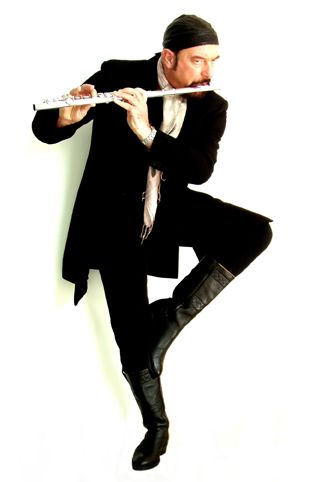Jethro Tull [Old Artist Archive]

Early in 1968, a group of young British musicians, born from the ashes of various failed regional bands gathered together in hunger, destitution and modest optimism in Luton, North of London. With a common love of blues and an appreciation, between them, of various other music forms, they started to win over a small but enthusiastic audience in the various pubs and clubs of Southern England. The breakthrough came when they were offered the Thursday night residency at London’s famous Marquee Club in Wardour Street, Soho.
The early Jethro Tull released their first blues-oriented album, This Was, in the latter part of 1968 before moving on to more homegrown and eclectic efforts in 1969 with Stand Up and a flutter of single releases, including Living In The Past, in the UK market.
Benefit, Aqualung, and Thick As A Brick followed and the band’s success grew internationally. Various band members came and went, but the charismatic front man and composer, flautist and singer Ian Anderson continued, as he does to this day, to lead the group through its various musical incarnations.
Jethro Tull were, by the mid-seventies, one of the most successful live performing acts on the world stage, rivaling Zeppelin, Elton John and even the Rolling Stones. Surprising, really, for a group whose more sophisticated and evolved stylistic extravagance was far from the pop and rock norm of that era.
With now some 30-odd albums to their credit and sales totaling more than 50 million, the apparently noncommercial Tull have continued over the next three decades to travel near and far to fans across the world.
After forty years at the bottom, at the top and various points in between, Tull are still performing typically more than a hundred concerts each year. Ian Anderson and Martin Barre remain at the center of a group of sometimes changing but highly capable, indeed excellent, musicians. Currently, Doane Perry, veteran Tull drummer of some 24 years experience, together with John O’Hara on piano and accordion, and David Goodier on bass guitar are to be found in the lineup, delighting audiences and continuing the legacy of Tull’s music with its rich variety and depth of expression wherever fans, young and old, want to hear rock, folk, jazz and classical-inspired music for grown-ups.
—Rodney Quill January 2008
Get The Pick Newsletter
All the latest guitar news, interviews, lessons, reviews, deals and more, direct to your inbox!
Since 1980, Guitar World has been the ultimate resource for guitarists. Whether you want to learn the techniques employed by your guitar heroes, read about their latest projects or simply need to know which guitar is the right one to buy, Guitar World is the place to look.

“I had to use the same microphone that Gene Simmons used with all the blood coming out of his mouth. Can you imagine that!”: Mick Rogers recalls Kiss supporting Manfred Mann's Earth Band in their early days

“Once Dave got his Roland Space Echo, it changed the vibe… that, and a lot of marijuana”: They inspired everyone from Oasis to the Smashing Pumpkins. Now English post-punk luminaries the Chameleons are back for more









